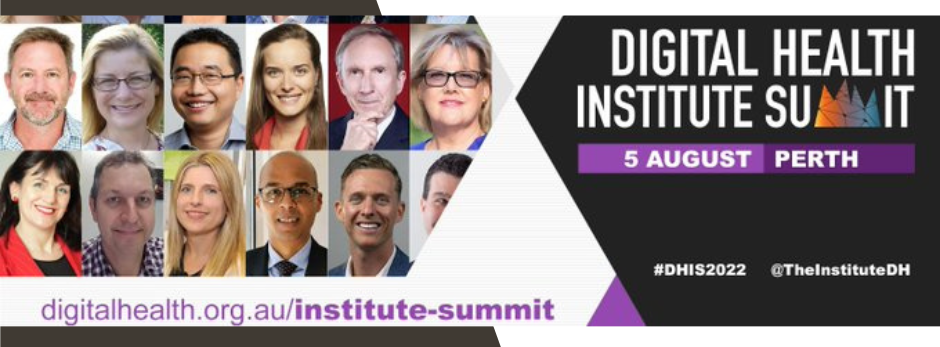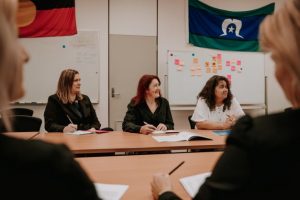
With the Wild Health Summit in Melbourne 18 October 2022, we are inspired by the idea that digital health could improve the patient experience even while the services themselves are quite fragmented. We need to continue to champion consumer voices in this space – too often they can be an after-thought.
We asked one of our consumer representatives, Robert McCormack, if he has any key questions or reflections to bear in mind for this upcoming Wild Health Summit event, having recently attended as a HCC consumer representative at the Digital Health Institute Summit (Perth 2022) held in August at the Perth Convention and Exhibition Centre.
Q: What were your highlights that might be of interest to health consumers?
A: I met a number of healthcare and IT professionals but did not see another health consumer. However in conversations with these professionals, several times they relayed personal experiences as either patients or as carers. Nonetheless, there is a case to have more consumers at the table.
Q: With no other consumers, do you have any comment on that – i.e. would it be of interest to consumers in future? Should we be advocating for more consumer places?
A: the need to engage widely with all stakeholders was emphasised by the keynote speaker, and I am of the view that the patient/carer/consumer needs to be seen as the principal stakeholder.
Q: any comment you might have on the value of you being there with a consumer lens?
(Mr McCormack was generous to provide us with a report on his experience at Digital Health Institute Summit (Perth 2022), which is summarised, below…)
Some Key Observations
The participation of over 200 delegates suggests there is substantial interest across the State in the potential benefits that could be delivered from the implementation of a solid digital health strategy.
The delegates comprised a good cross-section of health professionals including nurses, pharmacists, physiotherapists, and general practitioners through to senior executives from WA Health, and IT professionals with only a few health consumers.
The opening address by Simon Millman, the Parliamentary Secretary to the Minister for Health; Mental Health suggests the Western Australian Government has some commitment to digital health as also evident in its budget commitment to the first phase of developing a digital health record.
In conversation, most delegates acknowledged that while there has been some useful progress in rolling out aspects of digital health, considerable work needs to be done to achieve substantial potential benefits. One speaker described the current progress as additive rather than transformative.
Dr Helen Bevan, the keynote speaker, emphasised, with reference to her experience in the English National Health Service, the need to engage fully across the widest net possible of stakeholders to gain acceptance for proposed change, and this engagement needs to be done in the formative stages.
She particularly emphasised the need to identify and engage the key players, the “super-connectors”, in informal networks as well as dealing with the formal networks.
I note this approach contrasts with the experience of many health consumers in that they are too often ignored locally in the early developmental phases of most healthcare projects.
I am of the view that consumers as the clients of healthcare should be the primary stakeholders consulted in any proposed development of initiatives.
The fragmentation of responsibility for health across federal and state governments and the delivery of services across multiple providers presents particular challenges in assembling fragmented data. While the My Health Record potentially brings data together from a number of providers, the record for each patient is mainly incomplete and may not have up-to-date information.
Hospitals use a myriad of systems that don’t automatically share data although some progress is being made as evident in a presentation by staff from Fiona Stanley Hospital.
The development of artificial intelligence tools is seeing the improved diagnosis and management of healthcare.
For example (of the above), as evident in the Health in a Virtual Environment (HIVE) project at Royal Perth Hospital and research undertaken by the CSIRO in diabetic foot ulcer diagnosis and management.
The need to think beyond the current paradigms in healthcare delivery was highlighted in a presentation on delivering chemotherapy in the home by Lorna Cook Company Director & Co-Founder, View Health Chemo@home.
In a similar vein, it should be noted that COVID has caused a rethink on service delivery models which has seen, for example, the development of telehealth options and electronic prescriptions.
Digital health innovation has the potential to improve the patient experience in booking appointments, such as the Health Engine system developed by Dr Marcus Tan. In contrast, while the WA Health Department has invested in developing the Manage My Care app and is working on further enhancements to this app, this system is currently of limited use in that not all outpatient appointments are recorded on this system and patients have no opportunity to choose appointment times.
The trade stalls were mainly commercial IT companies who have had experience in developing and implementing systems across healthcare systems. We can expect some of these companies will have opportunities to roll out digital systems across the WA health service providers. It will be interesting to see the extent pre-existing systems will be adopted and the degree of customisation of these systems to meet our requirements versus bespoke development of new systems.
Concluding Remarks
While there have been several useful developments in the digital health space,
to realise the substantial benefits of a comprehensive integrated digital health strategy will require wider engagement of the broadest possible group of stakeholders at the earliest stages of the project with a particular focus on consumers/patients as the primary stakeholders together with the substantial investment of resources and talent over a prolonged period.
The Health Consumers Council can potentially play a key role in shaping the digital future of healthcare delivery by providing a broad range of consumer insights required for the critical success of the digital health strategy.
(This article/report is courtesy of Robert McCormack, HCC consumer representative.)





